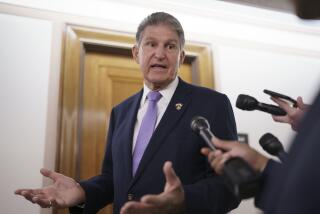Bush Team, Farm Bureau OK Deal to Revive Global Trade Discussions
- Share via
WASHINGTON — The Bush administration and the nation’s largest farm group on Monday approved a new deal to revive world trade talks, but other farm groups were less enthusiastic and Senate Minority Leader Tom Daschle (D-S.D.) accused the Bush administration of “selling out” U.S. farmers.
The Bush administration hailed Sunday’s agreement by the 147-nation World Trade Organization on a “framework” for freer global trade, saying it would eventually require the United States and other countries to make unprecedented cuts in farm subsidies.
The American Farm Bureau Federation, the largest U.S. farm organization, and other groups representing corn, wheat, soybean, cattle and sugar producers welcomed the interim agreement, while cautioning that difficult negotiations were still needed to reach an acceptable final deal.
Farm Bureau President Bob Stallman praised commitments by developed and developing nations in the agreement that he said would “lead to expanded market access for U.S. farmers and ranchers.”
However, U.S. officials acknowledged that a provision calling for a 20% reduction in domestic farm subsidies in the first year of any new agreement would not require actual cuts from current U.S. and EU spending levels.
“The key is we’re talking about a cut in permitted levels, not actual levels,” said U.S. Agriculture Undersecretary J.B. Penn. “You can cut 20% from your permitted level and not cut anything at all.”
WTO rules permit the United States to spend up to $49 billion annually on trade-distorting farm subsidies, but actual outlays last year were less than $20 billion, Penn said.
Even so, a final agreement could require the United States to cut domestic farm subsidies by as much as 50% and the European Union to cut such subsidies by as much as 70%, if other countries were willing to lower their farm trade barriers, said Allen Johnson, chief U.S. agricultural negotiator.
The deal puts world trade talks on track to a potentially successful conclusion in the next year or two after a disastrous meeting last September in Cancun, Mexico, that cast doubt on the WTO’s future as a negotiating forum.
The National Cotton Council expressed relief that cotton was not singled out for separate negotiations and early subsidy cuts, as four West African countries had originally demanded. But the group said it was still “disappointed to see cotton highlighted” in several parts of the framework.
The National Farmers Union warned the framework could gut the federal farm safety net. “Once again U.S. farmers are being asked to sacrifice on the altar of free trade without getting anything in return,” NFU President Dave Frederickson said.
Daschle, who is in a tight reelection race, blasted the agreement for favoring big agribusiness firms over small producers.
“It appears the Bush administration is selling out our farmers at the negotiating table,” Daschle said.
But Senate Finance Committee Chairman Charles E. Grassley (R-Iowa) said the agreement gave U.S. farmers a “historic opportunity” to win long-sought cuts in EU farm subsidies and new market openings around the world.
A spokesman for Democratic presidential candidate Sen. John F. Kerry had no immediate comment on the deal.
More to Read
Get the L.A. Times Politics newsletter
Deeply reported insights into legislation, politics and policy from Sacramento, Washington and beyond. In your inbox twice per week.
You may occasionally receive promotional content from the Los Angeles Times.









